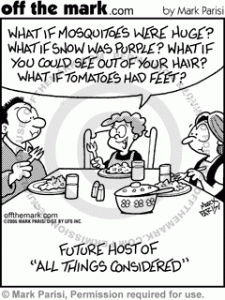“The important thing is not to stop questioning. Curiosity has its own reason for existing. One cannot help but be in awe when he contemplates the mysteries of eternity, of life, of the marvelous structure of reality. It is enough if one tries merely to comprehend a little of this mystery every day. Never lose a holy curiosity.”
–Albert Einstein
Now, I asked way too many questions as a child–questions that drove my parents crazy and my siblings crazier. At one point, I was actually banned from talking during movies because I was so relentless with my questions. I had a deep passion and thirst for knowledge, and was undaunted in my quest to find it. But my brain was not maturely developed, and simply asking questions isn’t a sign of a resilient curiosity. We have to know how to ask the right questions, backed by the right listening skills.
Let me be clear. I have a long way to go in developing mindful curiosity. I stumble through asking the wrong questions all the time. But after sitting in a therapy office for thousands of hours, hearing and asking a multitude of questions, I have a few thoughts on the subject. So here’s a short list of ways to develop a mature curiosity.
- Know your agenda. Then, set aside your agenda and listen.
- Consider your own predisposed perceptions and how they are coloring the questions you’re asking.
- Don’t just ask about the content of what the person is saying, ask also about the process.
- Slow down your response time to what you’re hearing. Take a deep breath and take a moment to process the whole landscape.
- Ask less questions, not more. Filter through and figure out what you really want to know, rather than asking five iterations of a similar question, as you try to refine what you’re asking.
- Ask sensory (what they see, hear, feel) questions more than logic (who, what, when) questions.
- Consider the whole picture, not just the immediate piece of the puzzle you’re encountering.
- Look for patterns.
- Once you’ve found patterns, look for a departure from the patterns and be curious about those.
- After listening,consider your agenda again and what you hope to gain from your interaction.
After you’ve implemented these tips, take some time to consider the conversation and be curious about what happened. Did the conversation take on a different shape and texture than anticipated? Did you learn anything you didn’t know before? Did your relationship with this person deepen in light of the questions you asked?
If you try this approach, I’d love to hear feedback. Let me know what you learn about yourself and about the other. Mindful curiosity has the ability to deepen relationships. I hope you find valued connection from your curious interactions with others.

